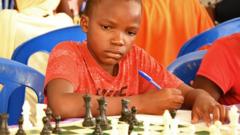In the slums of Kampala, Uganda, Robert Katende's SomChess Academy continues its vital work of empowering youth through chess, even as it confronts daunting financial challenges. Celebrated in the Disney film "Queen of Katwe," the academy is more than a chess club; it serves as a lifeline for many children in the impoverished neighborhood of Katwe.
Robert Katende, portrayed in the film by David Oyelowo, has dedicated over two decades to nurturing talent among children who struggle financially. Through chess, he sees an avenue for children to unlock their potential, a sentiment he shared during a recent BBC interview. He initially began his community outreach as a football coach before discovering the profound impact of chess as a tool for teaching critical thinking and strategic planning.
One of the academy’s most notable success stories is Phiona Mutesi, who, after joining the club at just nine years old, rose to become a national champion and international competitor. Her journey, which inspired the film, reflects not only her personal resilience but also the transformative influence chess can have on young lives.
Current academy members, like 18-year-old Patricia Kawuma, echo this sentiment, benefiting from scholarships and expanded life skills through chess. The academy has reached over 4,000 children, with many advancing to professional careers, thanks in part to earlier support from Disney following the film's release. Despite a one-time grant of $50,000 that enabled him to secure a permanent location for the academy, the aftermath of the film has not yielded the expected financial benefits for Katende or his program.
Following the film's disappointing financial performance, which left Katende without the promised shares of profits, the academy has struggled to maintain operations. Recent setbacks, including the COVID-19 pandemic, have compounded issues, leading to reductions in staff and resources. Katende reported a reduction from 14 to just eight staff members as funding dwindled.
Currently, over 2,500 children and 800 inmates are engaged in Katende's programs. They have access to an insufficient number of chess boards, necessitating adaptations in training methods. For talented players like Jovan Kasozi, the lack of funds has prevented participation in important international tournaments. Yet despite these challenges, Kasozi remains hopeful, crediting chess with enhancing his strategic thinking abilities.
Katende remains determined, optimistic that the horizon may brighten with future opportunities. He remains committed to his mission of changing lives through chess, emphasizing its metaphorical value in navigating the complexities of life. As the academy continues to function amid adversity, it exemplifies resilience, community support, and the undying spirit of its young players.




















